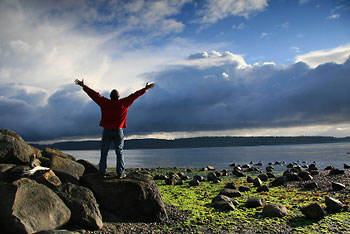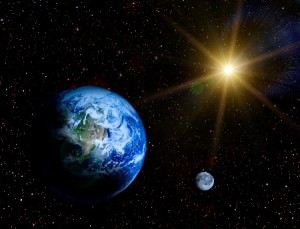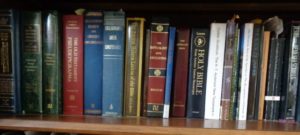One of the most popular verses in the entire Bible appears right in the beginning: Genesis 1:1.
In the beginning God created the heavens and the earth.
I think most would agree that this verse lays the groundwork for creation and the notion of a Creator God. It is fundamental for all that comes after it. But so often we read this passage with a preconceived idea in our minds of what this looks like.
For example, what picture comes to mind right now when you hear the entire phrase “the heavens and the earth?”
If you were to search that phrase in “Google Images”, the following is among the top results:

Does this image correspond with the picture that came to mind for you? I’m assuming the answer is yes.
It’s only natural for it to do so because we have been conditioned our whole lives as to how these words are depicted.
But this passage is an English translation of a Hebrew text. What does this verse say in Hebrew?
Gen 1:1 בראשׁית ברא אלהים את השׁמים ואת הארץ׃
Most of us, whose native tongue is the English language, have no idea what these characters are; let alone how to pronounce them. I do not profess to be proficient in the Hebrew language, but I have learned the Hebrew alphabet, and a variety of Hebrew words.
The word translated as “earth” is “erets” (H776). It comes from an unused root probably meaning to be firm. According to Brown-Driver-Briggs, the definition is “land, earth”.
According to the King James Concordance, this Hebrew word appears 2,502 times in the Old Testament; it is most often translated as “land” (1,509 occurrences), and second most as “earth” (712 occurrences). Did you catch that?
Erets (H776) is more than twice as often translated as “land” than as “earth”.
I’ve known for some time now that the Hebrew word “erets” was not only translated as “earth” but also as “land”, but I did not realize that “land” was hands down the most frequent translation.

NOTE: The bracketed [] words are added by the translator; they are not in the original text.
Sometime last year (2014), I began paying attention to the fact that while our culture teaches “the earth” consists of both land and seas, the Bible makes it clear that “Earth” is the “dry [land]”, and the seas are something entirely different: “the gathering together of the waters”.
When discussing the earth as it pertained to the Bible, I started transitioning to referring to “the earth” in my speech and writings as “the earth and seas”.
Then about a month ago, knowing that words mean things, and the image we get in our heads when reading particular words can be slightly altered when we exchange those words with something comparable, I decided to do an exercise concerning the Hebrew word “erets”.
Find and Replace
In The Earth: Letting the Bible Define Itself I shared a “Find and Replace” exercise (only I didn’t call it that there). Here’s how it is done:
- Find every reference of “erets” translated as “earth” in English.
- I did this by using the Strong’s Concordance on my eSword software to find every reference of H776 in the KJV translation. (This can also be done online through resources like BlueLetterBible.org.)
- I narrowed the search by specifically looking at all the occurrences of the word translated as “earth”.
- I copied and pasted this list of verses in a MS Word document. (This can also be done on something simple like Notepad.)
- Replace the word “earth” with the word “land”. Then see what you see.
- I used a feature in MS Word that allows you to “find” a particular word, and then “replace” it with something else. But you can manually go through and find the words to be replaced and replace them yourself.
Now you can just look at the individual verses or you can do what I like to do: read the verses in their immediate and greater contexts.
For example, here is what the verses containing “erets” in Genesis 1 looks like in its entire context, using the American Standard Version. (The replaced words are in ALL CAPS.)
In the beginning God created the heavens and the LAND. And the LAND was waste and void; and darkness was upon the face of the deep: and the Spirit of God moved upon the face of the waters.
And God said, Let there be light: and there was light. And God saw the light, that it was good: and God divided the light from the darkness. And God called the light Day, and the darkness he called Night. And there was evening and there was morning, one day.
And God said, Let there be a firmament in the midst of the waters, and let it divide the waters from the waters. And God made the firmament, and divided the waters which were under the firmament from the waters which were above the firmament: and it was so. And God called the firmament Heaven. And there was evening and there was morning, a second day.
And God said, Let the waters under the heavens be gathered together unto one place, and let the dry [land] appear: and it was so. And God called the dry [land] LAND; and the gathering together of the waters called he Seas: and God saw that it was good.
And God said, Let the LAND put forth grass, herbs yielding seed, and fruit-trees bearing fruit after their kind, wherein is the seed thereof, upon the LAND: and it was so. And the LAND brought forth grass, herbs yielding seed after their kind, and trees bearing fruit, wherein is the seed thereof, after their kind: and God saw that it was good. And there was evening and there was morning, a third day.
And God said, Let there be lights in the firmament of heaven to divide the day from the night; and let them be for signs, and for seasons, and for days and years: and let them be for lights in the firmament of heaven to give light upon the LAND: and it was so. And God made the two great lights; the greater light to rule the day, and the lesser light to rule the night: he made the stars also. And God set them in the firmament of heaven to give light upon the LAND, and to rule over the day and over the night, and to divide the light from the darkness: and God saw that it was good. And there was evening and there was morning, a fourth day.
And God said, Let the waters swarm with swarms of living creatures, and let birds fly above the LAND in the open firmament of heaven. And God created the great sea-monsters, and every living creature that moveth, wherewith the waters swarmed, after their kind, and every winged bird after its kind: and God saw that it was good. And God blessed them, saying, Be fruitful, and multiply, and fill the waters in the seas, and let birds multiply on the LAND. And there was evening and there was morning, a fifth day.
And God said, Let the LAND bring forth living creatures after their kind, cattle, and creeping things, and beasts of the LAND after their kind: and it was so. And God made the beasts of the LAND after their kind, and the cattle after their kind, and everything that creepeth upon the ground after its kind: and God saw that it was good.
And God said, Let us make man in our image, after our likeness: and let them have dominion over the fish of the sea, and over the birds of the heavens, and over the cattle, and over all the LAND, and over every creeping thing that creepeth upon the LAND. And God created man in his own image, in the image of God created he him; male and female created he them. And God blessed them: and God said unto them, Be fruitful, and multiply, and replenish the LAND, and subdue it; and have dominion over the fish of the sea, and over the birds of the heavens, and over every living thing that moveth upon the LAND.
And God said, Behold, I have given you every herb yielding seed, which is upon the face of all the LAND, and every tree, in which is the fruit of a tree yielding seed; to you it shall be for food: and to every beast of the LAND, and to every bird of the heavens, and to everything that creepeth upon the LAND, wherein there is life, I have given every green herb for food: and it was so. And God saw everything that he had made, and, behold, it was very good. And there was evening and there was morning, the sixth day.
And the heavens and the LAND were finished, and all the host of them. And on the seventh day God finished his work which he had made; and he rested on the seventh day from all his work which he had made.
(Gen 1:1-2:2 ASV)
This is such a familiar chapter for me, because I’ve been studying it intently over the past few years. Yet, I am amazed at how a Find and Replace exercise with the words “earth” and “land” can alter one’s view of this creation account.
Altering Perspectives:
From the Earth in the Heavens to the Land Underneath It
About a year ago, I put together a video that talked about the first four days outlined in this chapter, and when I got to the fourth day, I used an image in the video that portrayed the sun, the moon, and the earth as a globe in a dark heavens with stars all around.
At the time, I wasn’t thrilled with using the image, but it was impossible to show all the lights (sun, moon and stars) shining at the same time in a regular photograph. So I went with that image anyway.
But then I began to feel convicted for using that image because it was portraying the perspective of one being way up in or above the heavens looking down upon the earth. This passage came to mind:
How art thou fallen from heaven, O day-star, son of the morning! how art thou cut down to the ground, that didst lay low the nations! And thou saidst in thy heart, I will ascend into heaven, I will exalt my throne above the stars of God; and I will sit upon the mount of congregation, in the uttermost parts of the north; I will ascend above the heights of the clouds; I will make myself like the Most High. Yet thou shalt be brought down to Sheol, to the uttermost parts of the pit. (Isa 14:12-15 ASV)
While I have been up in a plane, I’ve never been up above the stars. Nor do I wish to be. So I eventually pulled the video, and more recently posted an updated version without that particular image.
I personally prefer the perspective of one being on the land and looking, not only around me, but also up to the heavens. I feel more grounded, where I believe I belong. It is YHVH God who sits above it all, and His redemption draws near.
Thus saith Jehovah, Heaven is my throne, and the LAND is my footstool: what manner of house will ye build unto me? and what place shall be my rest? (Isa 66:1 ASV)
[It is] he that sitteth above the circle of the LAND, and the inhabitants thereof are as grasshoppers; that stretcheth out the heavens as a curtain, and spreadeth them out as a tent to dwell in; that bringeth princes to nothing; that maketh the judges of the LAND as vanity. Yea, they have not been planted; yea, they have not been sown; yea, their stock hath not taken root in the LAND: moreover he bloweth upon them, and they wither, and the whirlwind taketh them away as stubble. (Isa 40:22-24 ASV)

Lift up your eyes to the heavens, and look upon the LAND beneath; for the heavens shall vanish away like smoke, and the LAND shall wax old like a garment; and they that dwell therein shall die in like manner: but my salvation shall be for ever, and my righteousness shall not be abolished. (Isa 51:6 ASV)
And then shall they see the Son of man coming in a cloud with power and great glory. But when these things begin to come to pass, look up, and lift up your heads; because your redemption draweth nigh. (Luk 21:27-28 ASV)
A New Perspective For You
If you’ve never done an exercise like what I mentioned above, I encourage you to try it out. I typically gain a new perspective on verses I’ve read who-knows-how-many-times-before when I do this. And usually I walk away with a richer understanding of the text.
Here’s a list of all the verses where the KJV translates “erets” as “earth”. Check it out for yourself and see what you can see. Then determine how that affects your understanding of the Biblical stance on “erets”.
From the beginning:
“In the beginning God created the heavens and the LAND.” (Gen 1:1 ASV)
To a promise for Israel’s future in Isaiah’s day:
For, behold, I create new heavens and a new LAND; and the former things shall not be remembered, nor come into mind. (Isa 65:17 ASV)
For as the new heavens and the new LAND, which I will make, shall remain before me, saith Jehovah, so shall your seed and your name remain. (Isa 66:22 ASV)



Thank you for this helpful article!
I researched on etymology of “earth” and found this…
http://www.etymonline.com/index.php?term=earth
Old English eorþe “ground, soil, dirt, dry land; country, district,” also used (along with middangeard) for “the (material) world, the abode of man” (as opposed to the heavens or the underworld), from Proto-Germanic *ertho (cognates: Old Frisian erthe “earth,” Old Saxon ertha, Old Norse jörð, Middle Dutch eerde, Dutch aarde, Old High German erda, German Erde, Gothic airþa), from extended form of PIE root *er- (2) “earth, ground” (cognates: Middle Irish -ert “earth”). The earth considered as a planet was so called from c. 1400. Use in old chemistry is from 1728. Earth-mover “large digging machine” is from 1940.
Thank you, Irma for that etymology research! I had wondered when the notion of “earth” being a globe/planet first came to be. The first edition of the KJV was in 1611, and the oldest alternate translation I have is the Bishops Bible from 1568, and they both say “earth” in Gen 1:1.
Wow! I agree that this exercise (of replacing “earth” with “land” is very helpful! It made a big difference in how I visualize and understand the words of Scripture. Thank you so much!
An interesting note… In Filipino/Tagalog, the phrase “heaven and earth” is translated as “langit at lupa.” The word “lupa” literally means “soil, ground, or land,” not “world.” (There is a different word for that, “mundo.”). I looked up the Tagalog translation of Genesis 1 and true enough, all the occurences of the word “earth” is translated as “lupa.”
Replacing “earth” with “land” makes me think of a plane, not a planet! Talk about years of programming! 🙂
Very cool about the Filipino/Tagalog translation. Thanks for sharing that! 😉
I just remembered… Even in Hebrew they use two different words: “erets” (land) and “olam” (world), right?
I think “olam” is only translated a few times as “world”, but there is another word that is translated as “world” a bunch of times (35 in the KJV): “tebel” (H8398).
Pingback: Latitude and Longitude on the Earth and Seas | Messyanic Misfits
Spot on. I keep looking for a semi major Bible translation which uses ‘Land’ in place of “earth”. I believe it is only a matter of time. Notice in Gen. 1:10 the KJV italicized the word ‘land’ as if it isn’t in the Hebrew text, and so they chose to translate Eretz as “earth” and consider ‘land’ as implied. Clearly the text make more sense when read as, “And God called [The Dry], ‘Land’…”Because [The Dry] had not been named yet. Instead the KJV italicized ‘land’ as implied by ‘LeYaBashah’ [The Dry], and that [The Dry] was named “earth”, but it was named “Eretz” ‘Land’! Blessings 🙏